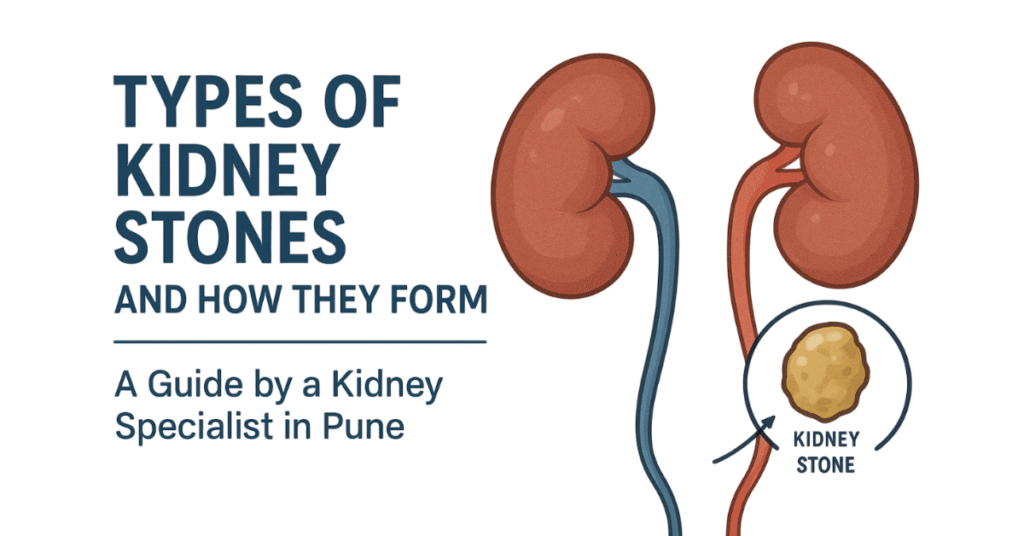Kidney stones are a common and painful urological condition affecting people of all ages. These hard deposits form inside the kidneys when minerals and salts in the urine crystallize. Understanding the types of kidney stones and how they form is essential for proper diagnosis, prevention, and treatment. In this blog, Dr. Rakshit Ahuja, a leading Kidney Specialist in Pune, shares expert insights into the different types of kidney stones and their causes.
What Are Kidney Stones?
Kidney stones, also known as renal calculi, are solid masses made of crystals. They vary in size, ranging from tiny grains to larger stones that can block the flow of urine. Depending on their composition, kidney stones are classified into different types. Identifying the type of stone is key to choosing the right Kidney Stone Treatment in Pune.
Types of Kidney Stones
1. Calcium Oxalate Stones
These are the most common type of kidney stones, formed when calcium combines with oxalate in the urine. Oxalate is naturally found in certain foods like spinach, nuts, and chocolate. Dehydration, high-oxalate diets, and certain metabolic disorders can increase the risk of these stones.
A Best Urologist in Pune, often advises patients to drink plenty of water and limit oxalate-rich foods to reduce recurrence.
2. Calcium Phosphate Stones
These stones are also calcium-based but form in alkaline urine. Conditions like hyperparathyroidism and urinary tract infections can increase the risk. Managing the pH balance of urine is crucial to preventing these stones.
As a Kidney Specialist, often recommends dietary and lifestyle changes along with medications for patients prone to calcium phosphate stones.
3. Uric Acid Stones
These form when urine is too acidic and is more common in people with high purine intake (found in red meat, shellfish, and organ meats). Individuals with gout or those undergoing chemotherapy are at higher risk.
Proper hydration and medications to reduce uric acid levels are essential. For those seeking Kidney Stone Treatment, early detection of uric acid stones can help avoid complications and more invasive treatments.
4. Struvite Stones
Also known as infection stones, struvite stones form in response to urinary tract infections (UTIs). They grow quickly and can become quite large, potentially causing serious kidney damage.
These stones require prompt medical attention. A trusted Urologist in Kharadi Pune, emphasizes the importance of treating the underlying infection to prevent struvite stones from forming or recurring.
5. Cystine Stones
Cystine stones are rare and usually hereditary, forming in individuals with a condition called cystinuria. This genetic disorder causes the kidneys to excrete too much cystine, which leads to stone formation.
As an experienced Urologist provides long-term treatment plans and monitoring for patients with cystinuria to help manage and prevent these challenging stones.
How Kidney Stones Form: The Science Behind It
Kidney stones develop when your urine becomes too concentrated, allowing minerals and salts to stick together and form crystals. Over time, these crystals grow into stones. The primary factors contributing to stone formation include:
- Dehydration: Not drinking enough water leads to concentrated urine.
- Diet: High intake of sodium, protein, and oxalate-rich foods can increase stone risk.
- Medical Conditions: Certain diseases like hyperparathyroidism, obesity, and urinary tract infections raise the likelihood of stone formation.
- Genetics: Family history plays a significant role, especially in rare types like cystine stones.
Prevention and Treatment Options
The good news is that kidney stones can often be prevented with lifestyle changes and proper hydration. However, when stones form, treatment depends on their type and size.
Kidney Stone Treatment offered by Dr. Rakshit Ahuja includes:
- Medical Therapy: Medications to dissolve small stones or prevent new ones.
- Extracorporeal Shock Wave Lithotripsy (ESWL): Non-invasive technique using shock waves to break stones.
- Laser Lithotripsy: Advanced procedure to fragment stones via ureteroscopy.
- Surgery: For very large or complex stones.
Regular follow-ups with a Kidney Specialist can help monitor your kidney health and avoid recurrence.
Why Choose us?
If you’re looking for expert care and personalized treatment, a highly experienced Urologist in Pune, is here to help. With a clinic conveniently located for those searching for a Urologist in Kharadi, Pune, Dr. Ahuja combines advanced diagnostic tools with a compassionate approach to ensure the best outcomes for his patients.
Final Thoughts
Kidney stones can be painful and disruptive, but with the right knowledge and care, they are manageable and often preventable. Understanding the types of stones and how they form is the first step toward effective treatment.
Whether you’re facing symptoms or want to avoid future episodes, consulting a trusted Kidney Specialist in Pune like Dr. Rakshit Ahuja ensures you’re on the right path. Don’t wait—your kidney health is worth protecting.
To book an appointment with Leading Urologist for expert Kidney Stone Treatment in Pune – contact us today.
📞 Book an Appointment: 98905 83933
🌐 Visit Our Website: www.drrakshitahujaurologist.com


 Select an element to maximize. Press ESC to cancel.
Select an element to maximize. Press ESC to cancel.